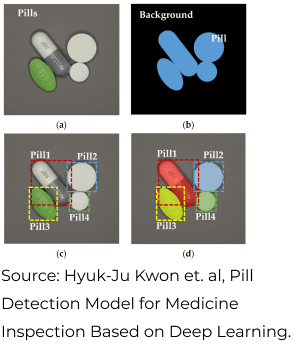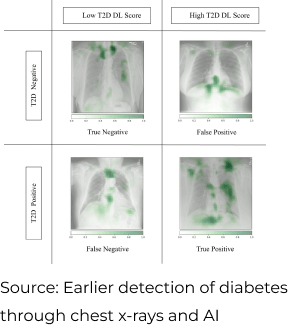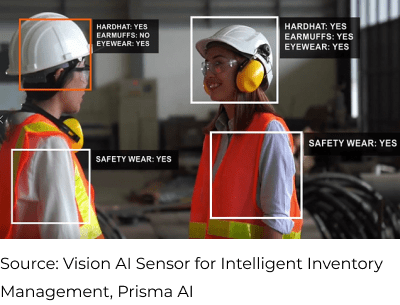Imagine you’re asked to name objects you find on a beach. Your immediate response might include elements like sand, waves, umbrellas, and beach chairs. Human vision perceives the three-dimensional structure of the world at ease.
Computer vision is one of the fields of artificial intelligence that trains and enables computers to understand the visual world. It seeks to replicate both the way humans see, and the way humans make sense of what they see. It incorporates AI, machine learning, and deep learning to enable computers to see videos and images for extracting certain pieces of information from them to solve a certain task. This helps it to accurately identify and classify objects and react to them.
Benefits of computer vision
Computer vision has a wide range of uses across industries like supply chain and logistics, automotive, retail, pharma, and more. By integrating artificial intelligence to automate visual tasks, it accelerates decision-making processes, minimizes errors, and transforms the way businesses operate in diverse sectors.
Computer Vision Automates Repetitive Tasks with Superior Efficiency
Computer vision systems outpace humans in executing repetitive tasks and processing data with greater speed. For example, automation has become integral to driving productivity in the pharma and retail sectors.
Automated pill counters, crucial for precision, swiftly handle the dispensing process of medications. A high-speed global shutter color camera captures tablets as they flow, with AI algorithms precisely identifying them based on unique features like shapes and colors, ensuring accurate medication dispensing. They identify and detect tablets, even when they fall in multiples and on different sides.

Improved Accuracy in Visual Data Analysis
Computer vision can analyze visual data with great accuracy, leading to reliable results, and improving product quality.

Integrating deep learning and computer vision, researchers created a model that effectively identified heightened diabetes risk in a retrospective study, often detecting the risk years before an official diagnosis. Trained on over 270,000 X-ray images from 160,000 patients, the AI model harnessed deep learning to identify image features that provided accurate predictions of future diabetes diagnoses.
Dark green pixels in Chest XRays highlight key features for the model’s prediction, focusing on cardiomediastinal, upper abdominal, lower neck, and supraclavicular regions.
Computer Vision Delivers Transformative Cost Savings for Businesses
Computer vision enables the system to address issues early, preventing potential escalation, and helps reduce costs and optimize resource allocation for significant Return on Investment (ROI).
In supply chain management, Intel leveraged computer vision to streamline warehouse management, eliminating multiple layers of manual validation. Their system featured a pilot workstation equipped with four Logitech cameras capturing all sides of the box, connected to a computer. Raw images were stored and used to generate ‘inferred’ results displayed in the user interface. This cost-effective setup yielded $4 million in savings within the first year, enabling rapid inspection and disposition of boxes in a matter of milliseconds.
Improved Decision-making Processes with Advanced Data Analytics
Leveraging computer vision offers instantaneous insights and data analytics, enhancing decision-making processes.
Integrating computer vision into the inventory management workflow enables real-time tracking of product availability, providing retailers with a competitive edge. Through continuous data collection using images and videos, the deep learning model is trained to classify and recognize inventory items, aiding in accurate stock tracking, predicting potential stockouts, and facilitating timely replenishment.
Studies indicate that a 3% increase in on-shelf availability (OSA) leads to a 1% sales increase for manufacturers, and a 2% OSA increase leads to a 1% sales boost for retailers.

Enhanced Customer Experience with Personalized Service Management
Utilizing computer vision enables to tailor products and services to individual customer preferences and behavior, fostering an enhanced customer experience and increased customer loyalty.
Amazon’s Just Walk Out technology seamlessly blends computer vision, image recognition, object detection, advanced sensors, deep learning, and generative AI to eliminate checkout lines in retail stores. Customers entering a concession stand can effortlessly grab items and make purchases without waiting in checkout lines. The specialized camera integrated with computer vision allows the system to uniquely identify who takes what and charge them correctly when they walk out. This technology has significantly increased throughput in the retailer’s busiest concourse, reducing congestion and ensuring a smoother flow at full capacity.
Enhanced Safety Management by Preventing Potential Threats
Employing computer vision for surveillance and security allows for the identification of potential threats and the prevention of accidents.

Computer vision offers real-time hazard detection capabilities in construction sector. The trained AI quickly identifies threats such as gas leaks, chemical spills, fires, and monitors worker safety gear, providing instant alerts. Its intelligent algorithms detect subtle changes, enhancing workplace safety by proactively mitigating risks often unnoticed by human surveillance.
At the intersection of artificial intelligence, machine learning, and neural networks, computer vision stands as a revolutionary force. By mimicking the innate human ability to perceive and comprehend the visual world, it enables computers to extract, classify, and respond intelligently to information in videos and images. It steps in to accomplish tasks that go beyond the capabilities of the human visual system, providing new scopes of efficiency and expanded possibilities.
Transform your business with cutting-edge visual AI Services from Random Walk AI! Explore AI integration services that redefine how you perceive and utilize Artificial Intelligence for unparalleled visual AI services. Explore more here.
